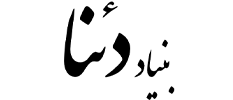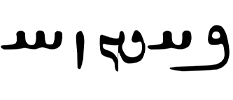HDM: handarz ī dānāgān ō mazdesnān | Counsel of the Wise to Mazdayasnians
Raha Asha
This text is known under the title of handarz ī dānāgān ō mazdesnān ‘Counsel of the Wise to Mazdayasnians’. It is partially (or, wholly?) in verse. Peshotanji B. Sanjana published this text in hāmdibīrīh (the so-called Book Pahlavi script) and Pāzand, with Gujarati and English translations in 1885 (§§ 160-169 of the Ganj-i Shāyagān). The text was edited in the Pahlavi Texts (II, Bombay, 1913): 51-54.
pārsīg
(1) gōš andar dāred pahlumīhā, mardōmān kē hed mazdesn ī kišvar, ašnaved hān ī dānāg gōbišn ī frārōn handarz ī Ohrmazd ud amehrspendān.
(2) ped ušahin gāh abar ēsted ōšumandān mardōmān, dādīhā dast ud rōy ped gōmēz ī gōspendān šōyed ud ped āb pāk šōyed, ud dādīhā vastarg ī pāk pōšed, ud ped nīrang ī dēn ī mazdesnān ebyānghan banned. ped menišn ud gōbišn ud kunišn ī frārōn menišnīgīhā ruvān rāy kār ud kirbag kuned ud ahlāyīh pursīdār baved.
(3) im rōz ka gētīgān hišt ēsted dā Ohrmazd ī xvadāy zīvišn ī gētīg ped meyān hiled, pēš az hān ī ka Astvihād abar rased ud Vāy ī vattar abar ō kirb nišīyed, ud višōbišn ī kālbod, uš ud vīr ud bōy ud gyān ud tan az kālbod judāg kuned, kālbod rīman ud agār kuned, dā sōšāns ud tan ī pasēn uš ud vīr ud bōy ud gyān ud tan ud kālbod ī mardōmān ēk ō did nē gumēzed.
(4) pas kālbod ī mardōmān ōn humānāg cōn draxt-ē ka kārend, ud rōyed ud abzāyed ud vaxšed, škennend ud brīnēnd ud vazēnend ud abar ō ātaš nihend, ud ātaš sōzed ud gugāred, ud vād ī ardā andar ō gēhān afšāned (parganed??), pas bē /ō/ ōy kē kāred ayāb dīd ēv-iz (= ēc) nē dāned kū xvad būd ayāb nē.
(5) pas az mardōmān andar gētīg ōy burzišnīgdar kē <az> harv frādahišnīh xvāstag bē ō kār kirbag handōzed, (6) abāg xvēšāvandān, dōstān, jud-dēnān mardōmān mihr mā druzed, nāf ud peyvann ī xvēs rāy hān ī abārōn mihrdruz mā kāred ped dušmat ud dušūxt ud dušvaršt.
(7) yezi. humatəm. <manō> +mańyete. (/+mańyāt̰?) hūxtəm. vāčim. mravat̰. hvarštəm. vərəziiāt̰. śyaoθanəm.
(8) cē agar humat mened ped menišn, ud hūxt gōbed ped gōbišn, ud huvaršt varzed ped varzišn, bē abespāred hān ī xvēš ruvān ped pahlum oxān ped humat ud hūxt ud huvaršt.
(9) cē Spennāg Mēnōg ast menišn humat ud gōbišn hūxt ud varzišn huvaršt, dēn gāhānīg abēzag veh dēn ī mazdesnān, pēšag huxēmīh, ud ristag ahlāyīh.
(10) yezi. dušmatəm. +mańyete. (/+mańyāt̰?) dužūxtəm. vāčim. mravat̰. dužvarštəm. vərəziiāt̰. śyaoθanəm.
(11) cē agar dušmat mened ped menišn, dušūxt gōbed ped gōbišn, dušvaršt varzed ped varzišn, bē abespāred hān ī xvēš ruvān ped hān ī vattum oxān ped dušmat ud dušūxt ud dušvaršt.
(12) cē Gennāg Mēnōg ast menišn dušmat, ud gōbišn dušūxt, <ud> varzišn dušvaršt, dēn jādūgīh, ud pēšag ahlemōgīh (frēftārīh?), ud ristag frēftārīh (durvandīh?).
(13) vazurg emēd ī kirbag rāy
vināh mā kuned!
(14) ped juvānīh vistāx mā baved – ōšumandān mardōmān!
cē vas kas ī ped aburnāyīh
az gētīg bē vidard hend,
vin ud abēdāg būd hend
būd ī dā dagr zamān pettāyist,
bē pas-iz frazām vidašt
vin ud abēdāg būdan abāyist.
(15) bē nūn ēn kunam
tis ī fraškirdīg abāyed
dagr zamān pettāyed ud nē višōbed.
(16) tan! hangār kū-m videred
kār ī gētīg;
hān ī grāmīg nāzūk kālbod barend
ped gyāg ī framōšān, ānōh
an-āyād bē nihend,
rōz ped rōz framōšēndar ud anāyāttar baved,
–būd ī abar pehikārend ud drōn nē yazend
ud an kē ruvān ham
stāyišnumand, az tō tan
mustumand ud garzišnīg bavam.
(17) dāram handarz-ē az dānāgān,
az guft ī pēšēnīgān,
ō ašmā bē vizāram
ped rāstīh andar gēhān;
agar az man pedīred
baved sūd ī do gēhān:
(18) ped gētīg vistāx mā bed
vas-ārzōg andar gēhān
cē gētīg ped kas bē nē hišt hend
nē kōšk ud xān-u-mān
šādīh ī ped dil cē xanned
ud cē nāzed, (19) gētīgān?
cand mardōmān dīd-am vas-xvāstagīh andar gēhān
cand xvadāyān –spāhbedān– dīd-am
meh-sālārīh abar mardōmān
avēšān meh vēš menīdār
bē raft hend andar gēhān
–kū «amāh mehdar hem andar gēhān»–
avēšān abrāh šud hend
abāg dard bē raft hend asāmān
(20) harv kē cōn ēn dīd cē rāy
ka vistār andar gēhān
ka nē dāred gētīg ped spanz
ud tan ped āsān?
kirbag ped kirdan dāred, ka fradāg ānōh abāyed šudan bē <pēš> dādvar rāst.
šād ud dagr-zīvišn ud farrox ud ahlō ud pērōzgar ud kāmaghanzām.
frazaft ped drūd ud šādīh ud rāmišn.
English
(1) Lend me your ears, O excellent people who are Mazdayasnians of the (Xvaniraθa) continent, and listen to the wise words and upright counsels of Ahura Mazdā and the Aməṣa Speņta.
(2) Rise up at dawn, O mortal men. Wash your hands and face lawfully with bull’s urine, and (then) with pure water. Lawfully put on clean clothes and with the (short) formula of the Daēnā Māzdyasni bind the sacred girdle. Heartily with upright thought and word and deed do good for the soul, and be a seeker of Righteousness (aṣa).
(3) Today, O earthlings, you have been left in the world so that the lord Ahura Mazdā may allow you earthly livelihood, before Astō.viδōtu arrives unexpectedly, and the bad Vāy (i.e. death) gets on the body, destroys the body, and separates intelligence, wit, consciousness, and (breathing) soul, and body (flesh, blood, etc.) from the skeleton, and make the skeleton filthy and ineffective, and till (the coming of) Saoṣyaņt and (the making of) the Final Body the intelligence, wit, consciousness, (breathing) soul, body and skeleton of people are not mixed one with the other.
(4) The body of men is just like a tree which is planted; it grows and increases and buds; it is broken and cut and carried and placed on the fire; the fire burns (it) and absorbs (it); and the righteous wind scatters (its ashes) on the world; then apart from those who planted it or saw it, no one knows if it indeed existed or not.
(5) Then among men of the world he is more esteemed who, instead of any affluent supply of material possessions stores good deed; (6) he does not break a promise with his relatives, friends and (even) people of other religions; and he does not plant, for his family and lineage, the promise-breaking (sapling), by bad thought and bad word and bad deed.
(7) [From the Avesta:] “If (he) thinks the well-thought <thought>, speaks the well-spoken word, does the well-done deed”
(8) For if he thinks good thoughts with thought, says good words with speech, and does good deeds with action, he will convey his soul to the Best Existence through (three steps): humata, hūxta, hvaršta.
(9) For the Holy Spirit (speņta mańyu) is (defined) thus: The thought (of His) is good thought, the word good speech, the action good deed, the religion Gāθic pure good Daēnā Māzdayasni, the profession good character, and the way righteousness.
(10) [From the Avesta:] “If (he) thinks the badly thought (thought), speaks the badly spoken word, does the badly done deed”
(11) For if he thinks evil thoughts with thought, says evil words with speech, and does evil deeds with action, he will convey his soul to the Worst Existence through dušmata, dužūxta, dužvaršta.
(12) For the Evil Spirit (aŋra mańyu) is (defined) thus: The thought (of his) is evil thought, the word evil speech, the action evil deed, the religion sorcery, the profession heresy, and the way deceit.
(13) For the great hope of good deeds
do not commit sin!
(14) Be not confident in the (days of) youth, O mortal men!
For many people, in tender years
have passed away from the world,
they vanished and disappeared
Some survived for a long time,
but at long last, even they passed by
–obliged to vanish, to disappear.
(15) But now I should do
something pertaining to the Renovation,
that lasts for long, that does not decay.
(16) O body! Imagine that passes away,
my worldly affairs;
they will carry the dear and delicate carcass
to the place of the forgotten (cemetery), there
they will put it down, unremembered,
day by day it will become more forgotten and unremembered;
some complain against it and do not consecrate the bread (for it so);
and I, who am the soul,
praising, with regard to you, the body,
I am complaining and reproving.
(17) I have a counsel from the wise
from the sayings of the ancients,
I will say it so, to you
(who are) in the world of life, truthfully;
If you accept it,
you will have profit for both worlds:
(18) Be not confident in the material world,
desiring much in the world
For they have not left the world for anyone,
neither a palace, nor a house and hearth.
Happy-go-lucky, why laugh
and boast, (19) O worldlings?
How many men have I seen, with much (wealth) in the world!
How many lords, many generals, have I seen,
in great leadership of people!
Highly and greatly arrogant,
they strode in the world
–that “we are superior in the world”.
They went away, their light put out;
in pain they went, and destitute
(20) Then everyone who has seen that, for what purpose is it
when he is careless in the world,
when he does not consider the world as an inn
and the body as restful?
Consider good deeds to be done, for tomorrow you have to go there, before the just judge!
Be joyful, long-lived, fortunate, righteous, victorious and successful!
Completed with peace, joy and pleasure.
PDF: HDM: handarz ī dānāgān ō mazdesnān | Counsel of the Wise to Mazdayasnians

